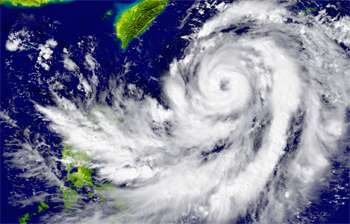Hurricanes, storm surges and icebergs – how warmer seas are changing our planet

Severe hurricanes, storm surges and an increase in the number of icebergs are just some of the changes planet Earth has experienced due to warming oceans over the last 20 years, according to a new report.
The report, Explaining ocean warming: causes, scales, effects and consequences, which is being presented at the IUCN World Conservation Congress in Hawaii this week (5 September 2016), has found the upper depths of the world's oceans have warmed significantly since 1995.
A chapter of the study, led by Professor Grant Bigg and Professor Edward Hanna from the University of Sheffield's Department of Geography, has revealed how this increase in sea temperatures has changed global weather patterns.
The Sheffield scientists have shown that the rise in ocean temperatures has caused an increase in the number of severe hurricanes and typhoons, such as Hurricane Katrina, which devastated New Orleans in 2005, and Typhoon Haiyan, which caused massive destruction in the Philippines in 2013.
Hurricanes have even been observed in the South Atlantic for the first time since satellite records began in the 1970s. The area was traditionally viewed as an unlikely region for hurricane formation because of its cooler sea surface temperatures, however in 2004 conditions were more favourable than normal due to warmer ocean temperatures, spawning Hurricane Catarina off the coast of Brazil.
The report also shows that warmer seas have resulted in a significant loss of ice in the Arctic region. The atmosphere in the polar regions has warmed at about twice the average rate of global warming with Arctic coasts experiencing a rise in the occurrence of storm surges.
This increase in storm surges can have a detrimental effect on fragile ecosystems in the area, such as low relief tundra, underlain by permafrost, according to the report.
Warmer oceans have also caused a distinct change in El Niño events – the warmer currents associated with the cycle have now been observed towards the central Pacific rather than the west, according to the Sheffield scientists.
Professor Grant Bigg, from the University's Department of Geography, said: "Many people may associate warmer seas with the pleasant weather conditions they're used to experiencing while on holiday, but the fact of the matter is that an increase in sea temperatures is having a huge impact on the world's weather.
"Our study has shown that severe hurricanes, storm surges, melting ice in the Arctic region and changes to El Niño are all being caused by sea temperatures rising across the planet. These are all things that can have a devastating impact on the way we live our lives.
"We hope that this research, together with studies presented by our colleagues in Hawaii this week, will help to shape the response of conservation and sustainable development to ocean warming."
The report also predicts what implications warming seas may have for our planet in the near future if current trends continue.
The continued warming of tropical oceans is likely to cause stresses on ecosystems, such as coral bleaching, and stronger tropical cyclones. It may also cause changes to climate over land, which could reduce crop production as temperatures rise.
This research is part of a report on ocean warming by some of the world's leading climate change scientists. The report is being presented at the IUCN's World Conservation Congress in Hawaii on 5 September 2016 at 8:30am (HAST).
More information: www.iucnworldconservationcongress.org/
Provided by University of Sheffield



















